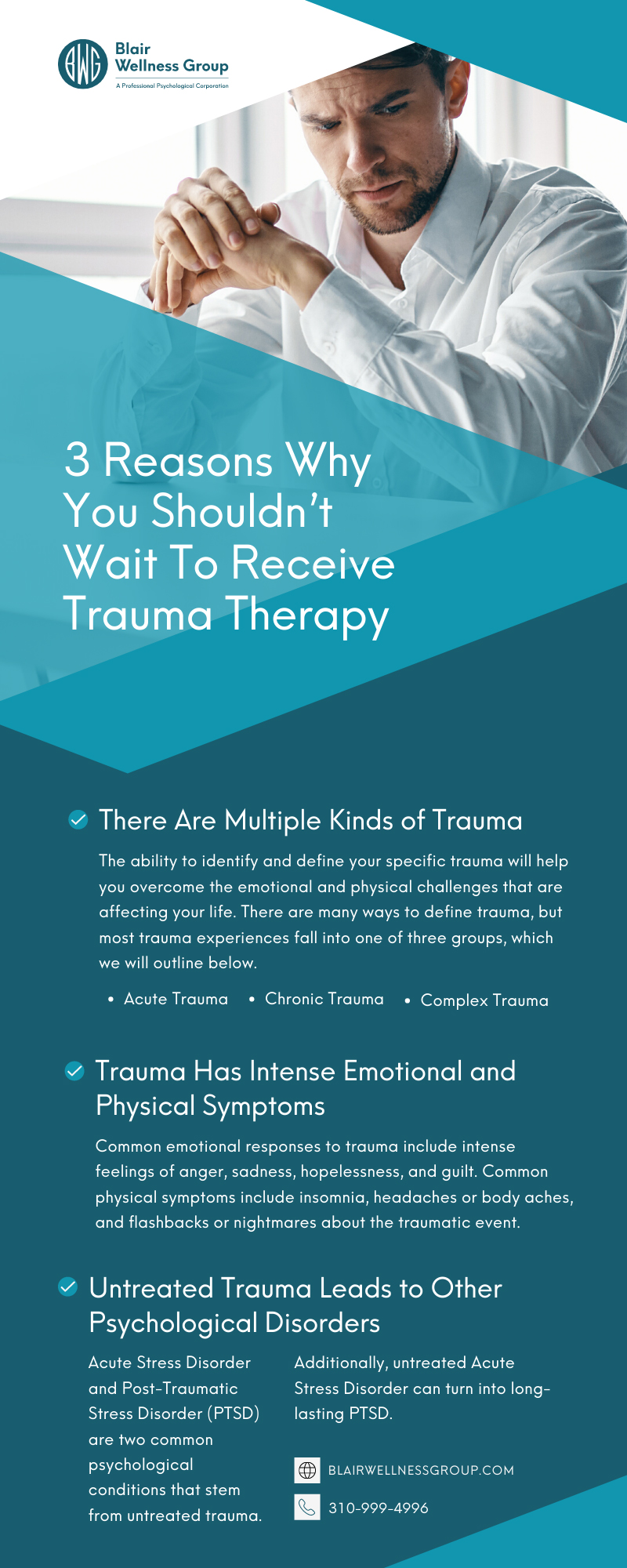Trauma is the response to a difficult, devastating, or even life-threatening event. The physical and emotional symptoms of trauma can last for months or years without treatment. A Qualified Psychologist with experience in trauma and trauma treatment can help you overcome the challenges of trauma so that you can heal.
Due to societal stigma, personal pride, or other factors, many people believe they need to cope with the symptoms of their trauma on their own. However, these symptoms can worsen over time and harm one’s quality of life. Seeking professional help early on allows you to heal from your trauma so that you can move forward with a confident, peaceful, and prosperous life. Read on to learn more about the reasons why you shouldn’t wait to receive trauma treatment from a Licensed Clinical Psychologist.
There Are Multiple Kinds of Trauma
Trauma is a complex condition that is unique to every individual that experiences it. One of the main reasons why you shouldn’t wait to receive trauma treatment is that professional treatment helps patients understand how their trauma works and where it comes from. This lays the groundwork for creating and implementing effective treatment plans.
The ability to identify and define your specific trauma will help you overcome the emotional and physical challenges that are affecting your life. An experienced Psychologist will be able to correctly diagnose your specific trauma so that you can work together to follow a customized treatment model. There are many ways to define trauma, but most trauma experiences fall into one of three groups, which we will outline below.
Acute Trauma
Acute trauma stems from a singular event such as an accident or an attack. It’s important to note that you don’t have to be the victim of such an event to experience trauma. Witnessing traumatic events or experiencing the sudden loss of a loved one can also result in acute trauma.
Acute trauma shares many physical and psychological symptoms with other types of trauma and trauma-related psychological disorders. The biggest difference between acute trauma and other trauma responses is that acute trauma is a short-term condition that usually lasts between a few days and a few weeks. That said, ignoring acute trauma instead of seeking professional help can lead to the development of more lasting disorders.
Chronic Trauma
Chronic trauma can occur after experiencing traumatic events over a long period of time. Military veterans or victims of ongoing abuse might experience chronic trauma. Chronic trauma can also stem from dealing with a serious long-term illness.
Chronic trauma lasts longer than acute trauma. Additionally, it sometimes takes longer for the physical and psychological symptoms of chronic trauma to arise. Someone with chronic trauma might not display a response to their trauma until weeks, months, or years after the traumatic event occurs. Unfortunately, this delayed response can make the symptoms of trauma more complicated and severe than acute trauma symptoms. That’s why professional treatment from a Licensed Clinical Psychologist is an invaluable part of addressing and overcoming chronic trauma.
Complex Trauma
Like chronic trauma, complex trauma stems from prolonged or repeated traumatic events. However, complex trauma also involves interpersonal relationships. Individuals with complex trauma are often victims of abuse, abandonment, or other forms of harm from people they personally know.
Individuals who experience complex trauma often have similar symptoms to those with other types of trauma. However, complex trauma also has unique psychological symptoms, such as chronic feelings of guilt or shame, difficulty controlling emotions, or the urge to isolate from others. People with complex trauma might fixate on their relationship with their abuser and become preoccupied with a desire for revenge. Alternatively, complex trauma victims might lose hope in systems they once found meaningful, such as religious faith or a belief in the good of people and society.
These symptoms have a significant impact on your life, but they don’t have to be permanent. A Licensed Clinical Psychologist will help you navigate your trauma and the physical and emotional responses you have to it so that you can heal and move forward with your life.
Trauma Has Intense Emotional and Physical Symptoms
Everyone experiences trauma differently. Some individuals have mild emotional and physical reactions, while others experience debilitating symptoms that affect their quality of life. Common emotional responses to trauma include intense feelings of anger, sadness, hopelessness, and guilt. Common physical symptoms include insomnia, headaches or body aches, and flashbacks or nightmares about the traumatic event.
Seeking treatment for trauma means seeking treatment for the symptoms that affect your life. Working with a Licensed Clinical Psychologist who has experience in trauma treatment helps you overcome these feelings and behaviors so that you can heal and improve your overall quality of life.
Untreated Trauma Leads to Other Psychological Disorders
As is the case with many mental health conditions, individuals who experience trauma are more likely to develop further psychological disorders. Acute Stress Disorder and Post-Traumatic Stress Disorder (PTSD) are two common psychological conditions that stem from untreated trauma. Additionally, untreated Acute Stress Disorder can turn into long-lasting PTSD.
Ignoring trauma and symptoms of trauma is instinctive for some people, but avoiding the issue doesn’t make it go away. Instead, untreated trauma can lead to more severe symptoms and the development of related issues, such as substance abuse, aggressive or unsafe behaviors, or strained relationships. The sooner you find professional help for your trauma, the sooner you can address these challenges, heal from your traumatic experiences, and regain control over your life.
When you seek treatment for your trauma, you also seek help for all the symptoms and conditions that affect your well-being. A Licensed Clinical Psychologist knows how to address your experience with trauma and address the other psychological conditions that interact with or stem from trauma. This comprehensive approach leads to customized treatment plans that systematically address all aspects of your trauma so that you can heal from your experiences and move forward to a better life.
Blair Wellness Group is a team of qualified trauma psychologist in Bel Air, Century City, Beverly Hills and Brentwood. We can provide you with evidence-based treatments so that you can stop simply coping with your symptoms and begin healing from your trauma instead. Find effective treatment and passionate care at Blair Wellness Group today.















